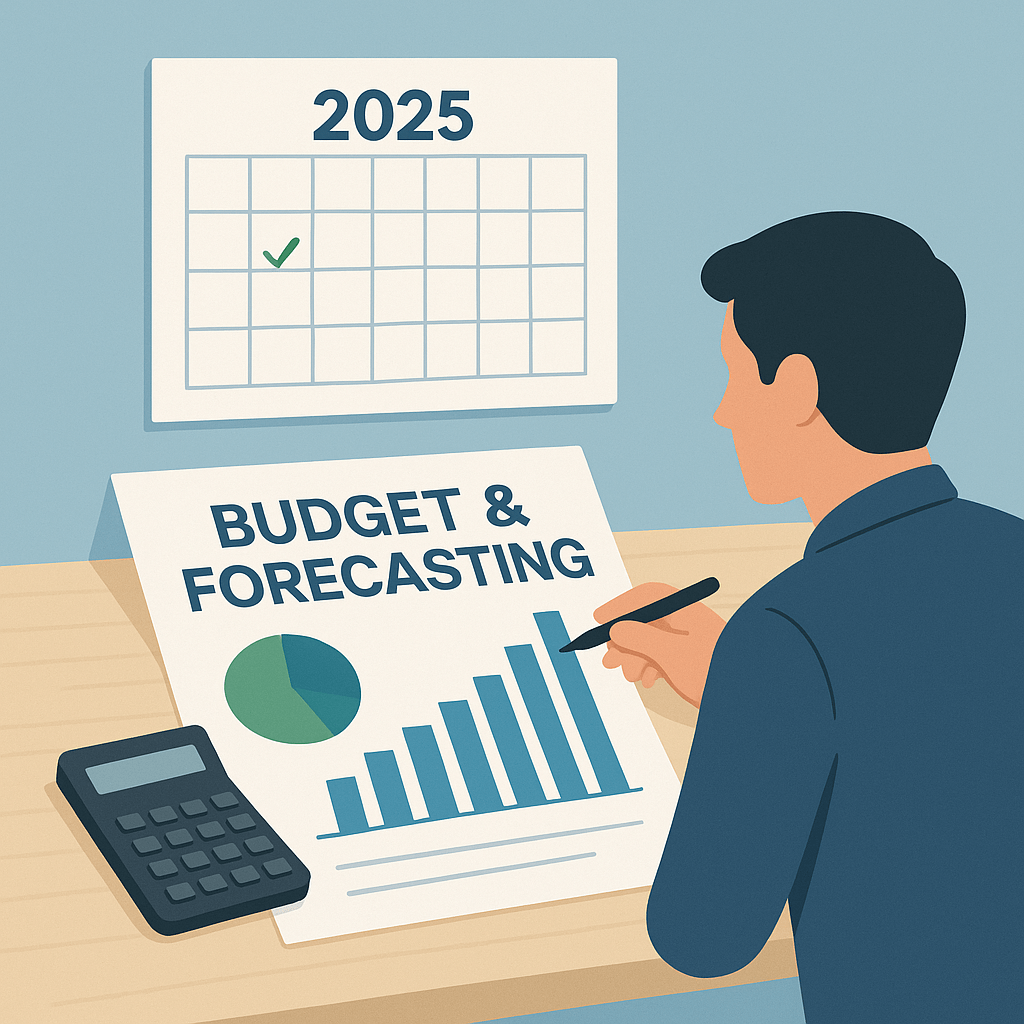As we move into the second half of 2025, small business owners are looking to take stock of their finances and plan strategically for the months ahead. May is the perfect time for budgeting and forecasting—key practices that help you manage cash flow, set realistic goals, and prepare for unexpected challenges.
Cloud-based accounting software can make these tasks easier by providing tools to create budgets, track performance, and forecast future revenue and expenses. In this article, we’ll compare four leading accounting platforms: QuickBooks Online, Xero, Zoho Books, and Sage 50cloud Accounting.
We will focus on their budgeting and forecasting features, pricing, usability, and more, to help you plan your year with confidence. We’ll also share practical tips to maximize these tools for your small business.
Why Budgeting and Forecasting Matter for Small Businesses
Budgeting and forecasting are essential for small businesses to maintain financial health and achieve growth. Budgeting involves setting a financial plan for a specific period, allocating funds for expenses, and ensuring you don’t overspend. Forecasting, on the other hand, uses historical data and trends to predict future revenue, expenses, and cash flow, helping you make informed decisions.
In 2025, with economic uncertainties like inflation and supply chain disruptions still lingering, these practices are more critical than ever. Accounting software streamlines these processes by automating data collection, generating reports, and providing insights, so you can focus on running your business rather than crunching numbers.
QuickBooks Online: Best for Detailed Budgeting and Reporting
Overview: QuickBooks Online, developed by Intuit, is a cloud-based accounting solution serving over six million businesses as of 2025. It’s known for its comprehensive features, making it a top choice for small businesses needing robust budgeting and reporting tools.
Budgeting and Forecasting Features:
Budget Creation: QuickBooks Online allows users to create budgets based on historical data or from scratch, with options to set monthly, quarterly, or annual budgets. Available in Plus and Advanced plans, you can create budgets for profit-and-loss, expenses, or specific projects.
Forecasting Tools: The Advanced plan includes Intuit Assist, an AI-powered tool that predicts cash flow trends and revenue based on past performance, helping with long-term forecasting.
Reporting: Offers detailed reports like budget vs. actuals, profit-and-loss, and cash flow statements, which can be customized to track budget performance over time.
Expense Tracking: Automatic expense categorization ensures accurate budget tracking, with real-time updates from bank feeds.
Integration with Excel: Export budget and forecast reports to Excel for further analysis, a feature appreciated by financial planners.
Pricing: Plans range from $35/month (Simple Start) to $235/month (Advanced), with a 30-day free trial or 50% off for the first three months.
Usability for Budgeting: QuickBooks’ interface is intuitive, with a dashboard showing budget-related metrics like expenses and income. Setup for budgeting involves selecting a plan that supports it (Plus or higher), inputting budget goals, and syncing bank accounts for real-time tracking. The mobile app supports expense tracking but lacks full budgeting functionality.
Best For: Small businesses needing detailed budgeting and forecasting tools, especially those with complex financial needs or project-based operations.
Xero: Best for Collaborative Budget Tracking
Overview: Xero, a cloud-based accounting software founded in 2006 in New Zealand, serves over 3 million businesses globally as of 2025. It’s designed for SMBs, offering scalability and collaboration features like unlimited users on all plans.
Budgeting and Forecasting Features:
Budget Manager: Available in the Established plan, Xero’s Budget Manager lets users create overall budgets or budgets for specific tracking categories (e.g., departments), with options for 3, 6, or 12-month periods.
Forecasting via Analytics: Xero Analytics Plus (an add-on for $10/month) provides short-term cash flow forecasts for 30, 60, or 90 days, using historical data to predict inflows and outflows.
Reporting: Reports like budget variance and profit-and-loss help track performance against budget goals, with advanced reporting in the Established plan.
Bank Reconciliation: Automatic transaction matching ensures accurate data for budgeting, though occasional bank reconnects may be needed.
Collaboration: Unlimited users allow teams to collaborate on budget planning, with role-based access to control permissions.
Pricing: Plans range from $15/month (Early) to $78/month (Established), with Analytics Plus at $10/month. A 30-day free trial and a 75% discount for the first three months are available.
Usability for Budgeting: Xero’s clean dashboard and sidebar navigation make budget tracking accessible, though budgeting features are limited to the Established plan. The mobile app, updated in 2025, supports report viewing but not budget creation, requiring desktop access for setup.
Best For: Small businesses with collaborative teams needing scalable budget tracking, especially service-based firms with multiple stakeholders.
Zoho Books: Best for Budget-Friendly Planning
Overview: Zoho Books, launched by Zoho Corporation in 2011, is a cloud-based accounting solution for small businesses, offering a free plan for those earning under $50,000 annually. It’s known for affordability and automation.
Budgeting and Forecasting Features:
Budget Creation: Available in the Premium plan and above, Zoho Books allows users to set budgets for income, expenses, or specific accounts, with options to compare actuals vs. budget monthly or quarterly.
Forecasting via Reports: While Zoho Books doesn’t have dedicated forecasting tools, its profit-and-loss and cash flow reports help predict trends by analyzing historical data, with custom reports in higher plans.
Expense Tracking: Automated bank imports and expense categorization ensure accurate budget data, with receipt uploads for detailed tracking.
Project Budgeting: Track project-specific budgets by logging time and expenses, ideal for service-based businesses.
Alerts and Notifications: Set budget overrun alerts to stay on track, a feature unique to Zoho Books among budget tools.
Pricing: A free plan is available, with paid plans from $15/month (Standard) to $240/month (Ultimate). A 14-day free trial of the Premium plan is offered.
Usability for Budgeting: Zoho Books’ setup is simple, with a dashboard showing budget performance alongside receivables and expenses. Budget creation requires the Premium plan, but the interface is intuitive, and the mobile app supports expense tracking for on-the-go updates.
Best For: Budget-conscious small businesses needing affordable budgeting tools with automation, especially those already using the Zoho ecosystem.
Sage 50cloud Accounting: Best for Detailed Financial Planning
Overview: Sage 50cloud Accounting, developed by Sage Group PLC, is a hybrid desktop-cloud solution for SMBs, particularly in industries like retail and construction. It combines robust reporting with cloud connectivity for remote access.
Budgeting and Forecasting Features:
Advanced Budgeting: Available in Premium and Quantum plans, Sage 50cloud supports detailed budgeting for income, expenses, and departments, with options to create multiple budgets for different scenarios.
Forecasting via Reports: Over 100 prebuilt reports, including budget vs. actuals and cash flow statements, allow for detailed forecasting based on historical data, with fast report generation.
Job Costing: Tracks costs and revenue for specific projects, helping with project-based budgeting (Premium and Quantum plans).
Multi-Company Budgeting: The Quantum plan supports budgeting across multiple companies, ideal for businesses with subsidiaries.
Excel Integration: Export budget and forecast reports to Excel for advanced analysis, a feature financial planners appreciate.
Pricing: Plans range from $62.50/month (Pro Accounting) to $149.08/month (Quantum Accounting) for one user, with additional users at $31.25/month each. A 30-day free trial or TestDrive is available.
Usability for Budgeting: Sage 50cloud’s setup is more complex, requiring software installation and accounting knowledge for budget creation. The dashboard is customizable but dated, and budgeting features are limited to higher plans. The mobile app supports basic tasks but not budget management.
Best For: Small businesses that need detailed budgeting and forecasting for complex operations, such as retailers or contractors, though it’s pricier and less intuitive.
Tips for Effective Budgeting and Forecasting with Accounting Software
Set Clear Goals: Define your budget goals—whether it’s reducing expenses or increasing revenue—and use QuickBooks Online or Zoho Books to allocate funds accordingly.
Use Historical Data: Leverage past performance data in Xero or Sage 50cloud to create realistic forecasts, adjusting for seasonal trends or economic changes.
Track Regularly: Monitor budget performance weekly or monthly using reports in QuickBooks Online or Zoho Books to catch issues early.
Involve Your Team: Use Xero’s unlimited users to collaborate on budget planning, ensuring all stakeholders are aligned.
Forecast for Different Scenarios: Create multiple budgets in Sage 50cloud to prepare for best-case, worst-case, and expected scenarios, enhancing preparedness.
Integrate with Other Tools: Export data to Excel from QuickBooks Online or Sage 50cloud for advanced forecasting, or use Zoho Books’ integrations with Zoho Analytics for deeper insights.
Which Software Should You Choose for Budgeting and Forecasting in 2025?
For Detailed Budgeting and Reporting: QuickBooks Online is the best choice for its robust budgeting tools, AI-driven forecasting, and detailed reporting, ideal for businesses with complex needs.
For Collaborative Budget Tracking: Xero excels for teams needing unlimited users and scalable budget tracking, with forecasting add-ons for growing businesses.
For Budget-Friendly Planning: Zoho Books offers affordable budgeting with a free plan and strong automation, perfect for small businesses on a tight budget.
For Detailed Financial Planning: Sage 50cloud suits businesses needing advanced budgeting and forecasting for complex operations, though it’s more expensive and less user-friendly.
Final Thoughts
Budgeting and forecasting in 2025 are vital for small businesses to navigate economic uncertainties and achieve growth. QuickBooks Online provides the most comprehensive tools for detailed financial planning, while Xero offers collaboration and scalability for growing teams.
Zoho Books delivers budget-friendly options with automation, and Sage 50cloud excels in advanced budgeting for complex operations. Take advantage of free trials—available with all four platforms—to test their budgeting features and find the best fit for your needs.
By leveraging these tools and following our tips, you’ll be well-equipped to plan the rest of your year with confidence, setting your small business up for financial success in 2025.

